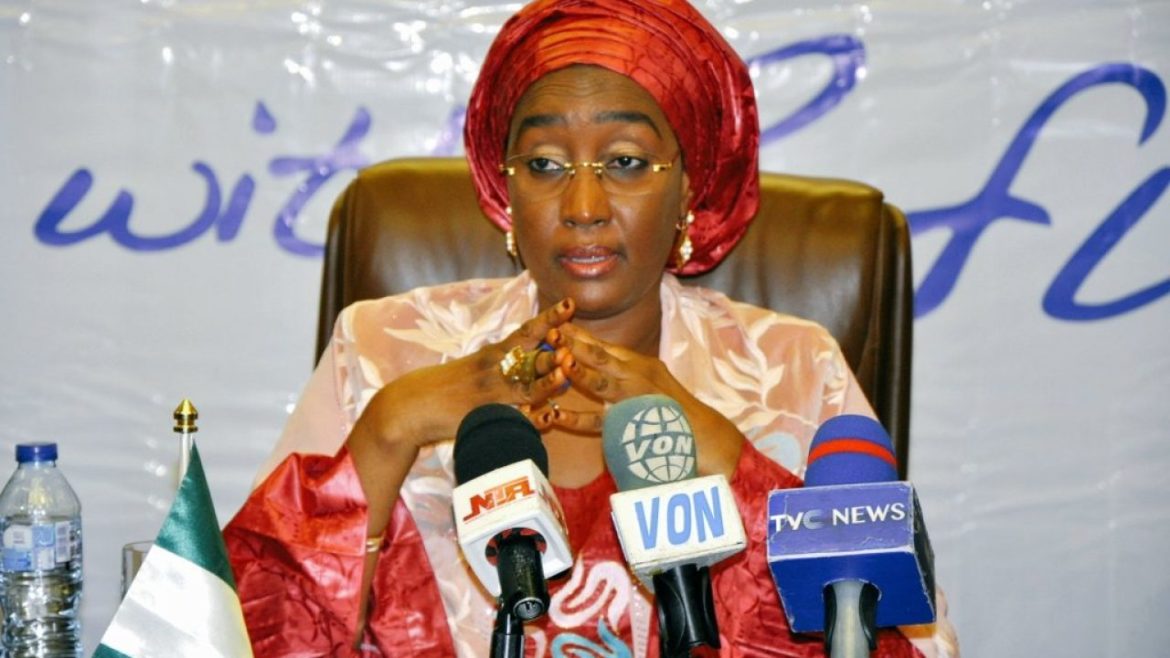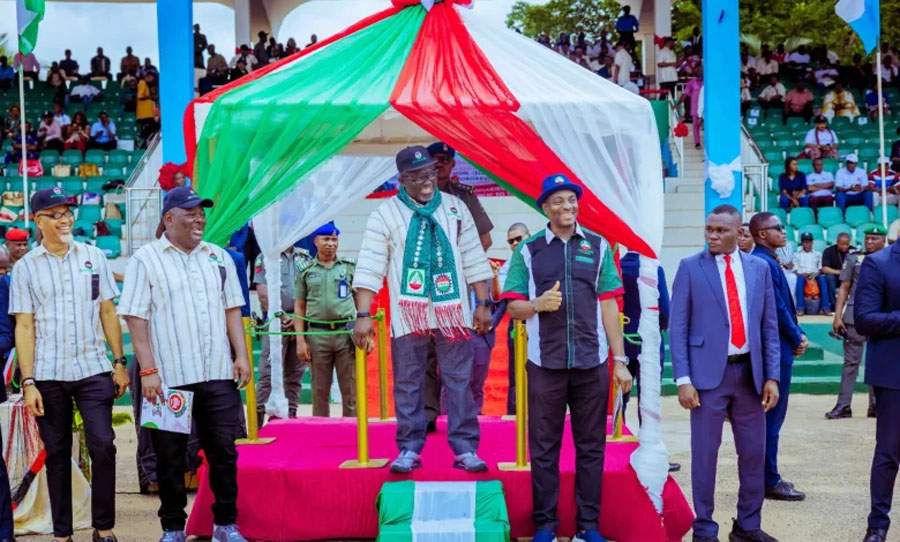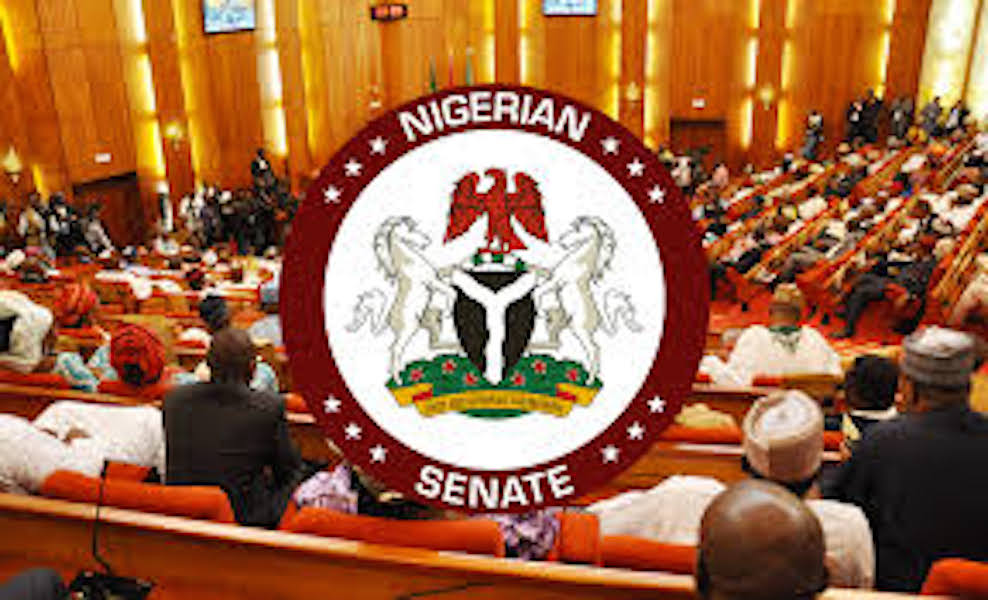News
Fed Govt rolls out nationwide loan programme for indigents

The Federal Government has officially rolled out the Government Enterprise Empowerment Programme (GEEP 2.0).
The Minister of Humanitarian Affairs, Disaster Management and Social Development, Hajiya Sadiya Umar Farouq, who launched the national phase of the programme in Katsina State, said the programme would be replicated in all the states of the federation.
The minister said with the rollout of the programme, disbursement of loans would begin in all the states of the federation.
At the presentation of cheques to peasant farmers and petty business women, she said the interest-free loans to beneficiaries was in line with President Muhammadu Buhari’s commitment to fighting poverty and its devastating impact from all angles.
READ ALSO:
- Lagos Taskforce arrests suspected land grabbing syndicate
- Liz Truss named as Britain’s prime minister, promises tax cut, improved economy
- Tinubu denies ownership of Oriental Hotel, other assets
The GEEP programme is categorised into three: TraderMoni loan of N50,000 targeted at uplifting the underprivileged and marginalised youths between the ages of 18 and 40 years; MarketMoni loan, also N50,000, for the underprivileged and marginalised women, like widows, divorcees, and other vulnerable groups; and the FarmerMoni loan, which is between N50,000 and N300,000 designed for small scale farmers in the communities to improve their agricultural productivity and inclusion in commercial farming.
In a statement in Abuja by the media aide to the minister, Nneka Anibeze, Hajiya Farouq said: “GEEP is a programme designed by President Buhari’s administration to create further opportunities for the poor, vulnerable and low-income Nigerians, especially those who are involved in viable informal productive activities with limited financial requirements but have never had access to loans from the formal financial sector.
“It is meant to give priority to the most vulnerable in our society, like widows, youth, persons with disabilities and the internally displaced persons (IDPs), amongst others.”
According to the statement, 59,161 potential beneficiaries were registered across the 34 local government areas of Katsina State but only 13,000 beneficiaries were verified and cleared to benefit from the interest-free loans for the first phase of the programme, while new registration is yet to commence.
The minister said the second phase of registration for 2022, which would accommodate more vulnerable individuals and groups, would be announced publicly.
News
Drama as Delta workers boo Gov Oborevwori over minimum wage

Drama as Delta workers boo Gov Oborevwori over minimum wage
Delta State workers expressed their disappointment with Governor Sheriff Oborevwori on Wednesday as he failed to address the issue of minimum wage during the 2024 May Day celebration in Asaba, themed “People First.”
Anticipating news on the minimum wage, the workers were disheartened when the Governor concluded his speech without mentioning it, prompting them to chant, “no, no, no, we no gree, pay us our minimum wage.”
Despite the interruption, Oborevwori stood firm, stating, “Listen to me, listen to me, calm down, calm down, you cannot cajole me.”
The celebration, which included a march past by various affiliate unions, turned sour due to the workers’ dissatisfaction with the governor’s silence on the wage issue.
READ ALSO:
- Neighbour, son beat mother of four to death in Edo
- London sword attack leaves British-Nigerian teenager dead
- Lagos uncovers 86 rooms under Ikoyi bridge where tenants pay N250,000 rent
According to a union leader, previous attempts to address the matter with the Governor proved futile.
In response, Governor Oborevwori announced plans to establish a committee to address the workers’ demand for salary increases amidst prevailing economic challenges. He praised the workers for their support and assured them of his administration’s commitment to workers’ welfare.
“I have listened attentively to your requests, and I have taken note of them; they are, no doubt, legitimate demands and as a responsible government, I will deliberate with my team on how best to address them within the limits of the resources available to us,” he affirmed.
In a statement delivered by Comrade Goodluck Ofobruku, the State Chairman of the Nigeria Labour Congress, NLC, he emphasized the importance of politicians keeping their promises, stating, “We want promise keeper politicians because, as workers, we keep records of promises.”
Drama as Delta workers boo Gov Oborevwori over minimum wage
News
Two million bank accounts closed over BVN, NIN, others

Two million bank accounts closed over BVN, NIN, others
Commercial banks in Nigeria closed 2.021 million bank accounts in the first quarter of 2024, Q1’24, to clean their books of questionable accounts and comply with regulatory orders on the linkage of bank accounts to the National Identity Number, NIN.
This is contained in a report by the Nigerian Interbank Settlement System, NIBSS, which also indicated that the number of inactive bank accounts grew month-on-month, MoM, by four million or 2.0 per cent to 19.7 million in March 2024 from 19.3 million in the previous month, February.
A bank account is classified inactive when it records zero transactions including deposits, withdrawals, transfers or point-of-sale transactions for six months.
READ ALSO:
- Senate insists on 16 years as requirement for tertiary institution admission in Nigeria
- Minimum wage: Labour threatens nationwide strike by end of May
- UCL: Füllkrug gives Dortmund 1-0 first-leg win over PSG
However, details of the “Industry Bank Account Database”, a monthly data reported by banks, and compiled by the Nigerian Interbank Settlement System, NIBSS, also indicated that the number of active bank accounts grew by 6.62 million or 3.0 per cent to 219.64 million from 213.02 million in February.
Recall that in December 2023, the CBN issued a directive to all commercial banks in the country to restrict tier-1 accounts without proper Biometric Verification Number, BVN, and National Identity Number, NIN, that are not linked by Thursday, March 1st, 2024.
According to NIBSS data on BVN enrollment count, 61.6 million Nigerians have BVN as of April 2024.
Two million bank accounts closed over BVN, NIN, others
News
Senate insists on 16 years as requirement for tertiary institution admission in Nigeria

Senate insists on 16 years as requirement for tertiary institution admission in Nigeria
The Nigerian Senate has moved to clarify recent discussions regarding the minimum age requirement for admission into tertiary institutions.
The red chamber assured Nigerians that the current age requirement of 16 years has not been altered and that recent comments suggesting an increase to 18 years were personal opinions.
READ ALSO:
- Minimum wage: Labour threatens nationwide strike by end of May
- UCL: Füllkrug gives Dortmund 1-0 first-leg win over PSG
- Adopt quarterly exchange rate for Customs duty, economist advises FG
Chairman of the Senate Committee on Media and Public Affairs, Adeyemi Adaramodu, emphasised that any changes to the age requirement would require legislative action following due process.
Adaramodu explained in an interview with journalists that comments made by the Minister of Education, Prof. Tahir Mamman, about increasing the minimum age limit were not legally binding but rather personal opinions.
The Minister of Education had previously hinted at plans to review and raise the minimum age for admission into tertiary institutions to 18 years.
Senate insists on 16 years as requirement for tertiary institution admission in Nigeria
-

 metro1 day ago
metro1 day agoLabour Day: Nigerian workers are dedicated, resilient, says NURTW leader
-

 Education3 days ago
Education3 days agoBREAKING: JAMB releases 2024 UTME results
-

 Auto16 hours ago
Auto16 hours agoAppeal court takes over NURTW case as NIC withdraws
-

 News2 days ago
News2 days agoFG set to repatriate 20,000 Nigerians from Chad, Cameroon
-

 News2 days ago
News2 days agoAmid fuel scarcity, petrol marketers threaten to withdraw services over ₦200bn debt
-

 News3 days ago
News3 days agoGanduje probe: Kano commission invites public for information
-

 metro3 days ago
metro3 days agoBREAKING: Suspected herders kill 3 mourners, farmers in Enugu
-

 News3 days ago
News3 days agoTerrorist negotiator Tukur Mamu seeks transfer out of DSS custody to Kuje prison




















